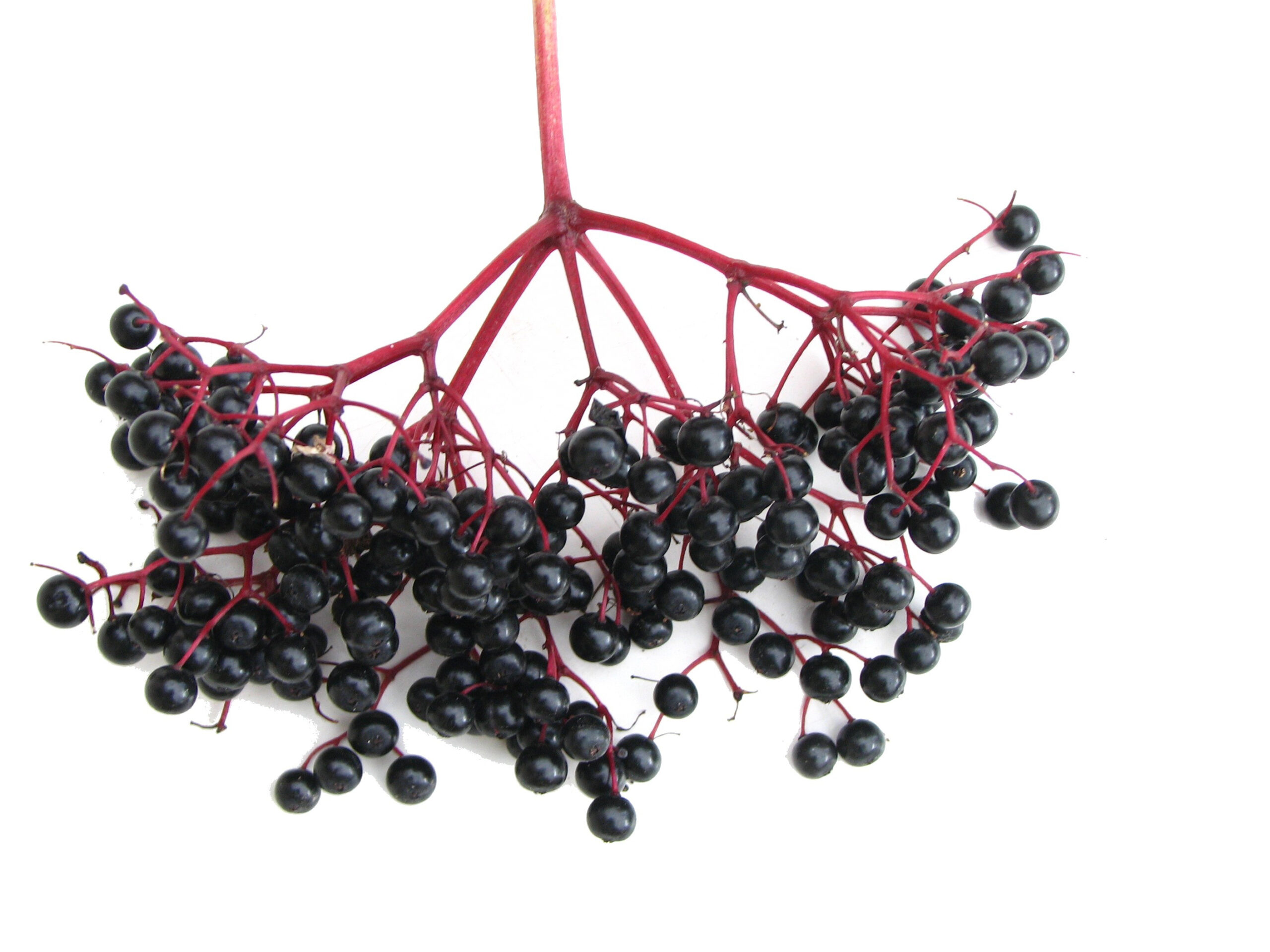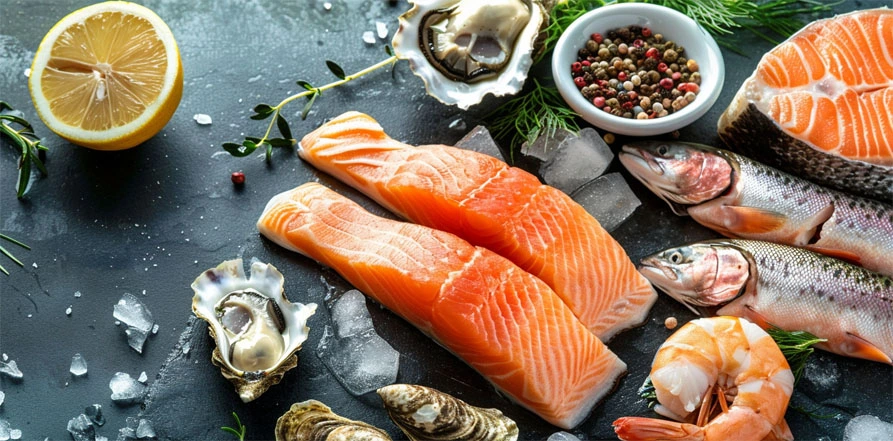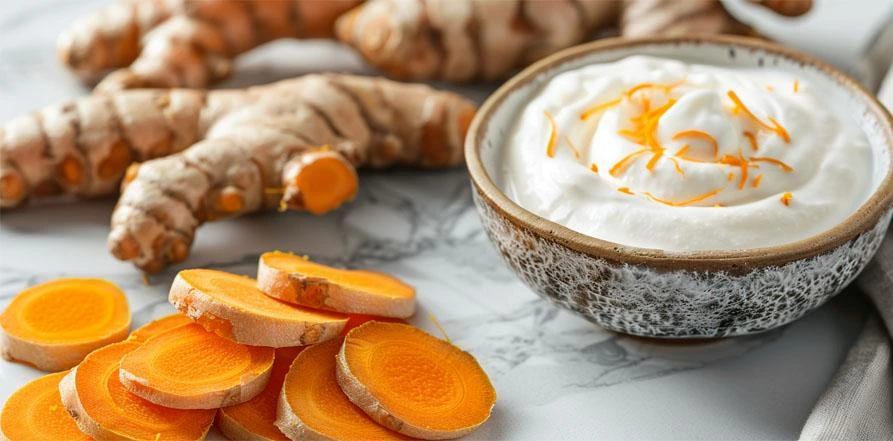False information can spread like wildfire, particularly during times of fear and uncertainty. Right now, there is misinformation circulating about elderberry (Sambucus nigra) and COVID-19.
Elderberry extract is being falsely accused of triggering a cytokine storm or cytokine release syndrome (CRS), an intense inflammatory response that can be deadly. During the SARS epidemic, CRS caused severe lung damage and was a driving factor in many fatalities.
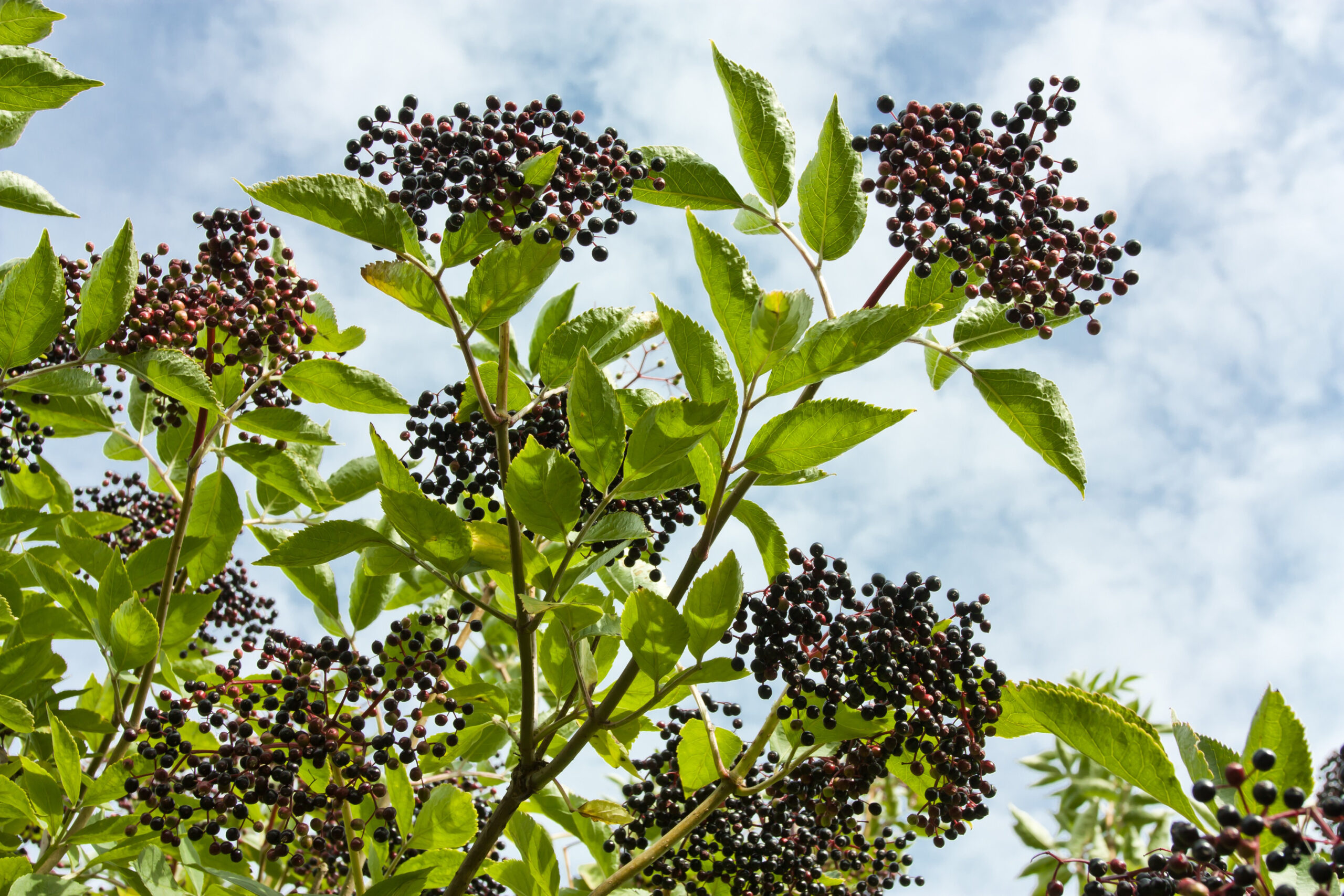
Without anyone asking questions to verify the source and the science behind the claims, misinformation can easily become accepted as truth. But we must always ask who is the source and do they have the authority to speak on such matters, particularly when the information is contrary to science and tradition.
The Role of Plants in Immune Function
The immune system plays a pivotal role in maintaining the steady state of the biological system. Through a process called immunomodulation, the immune system regulates various immune-competent cells against invaders, malignant cells and all other diseases. This system is in constant flux.
When the immune system is fighting pathogens, cytokines signal immune cells such as T-cells and macrophages to travel to the site of infection. In addition, cytokines activate those cells, stimulating them to produce more cytokines. If this natural response spirals out of control, cytokines attack healthy organs and cells, resulting in a cytokine storm.1
Viral interactions with the first line of defense “innate” immune system play a central role in determining the outcome of infection. Early control of viral replication by type I Interferons, complement proteins, and other innate immune mediators limit viral spread within the host during the early phases of the disease.2
Interferon Sensing and Signaling Pathway
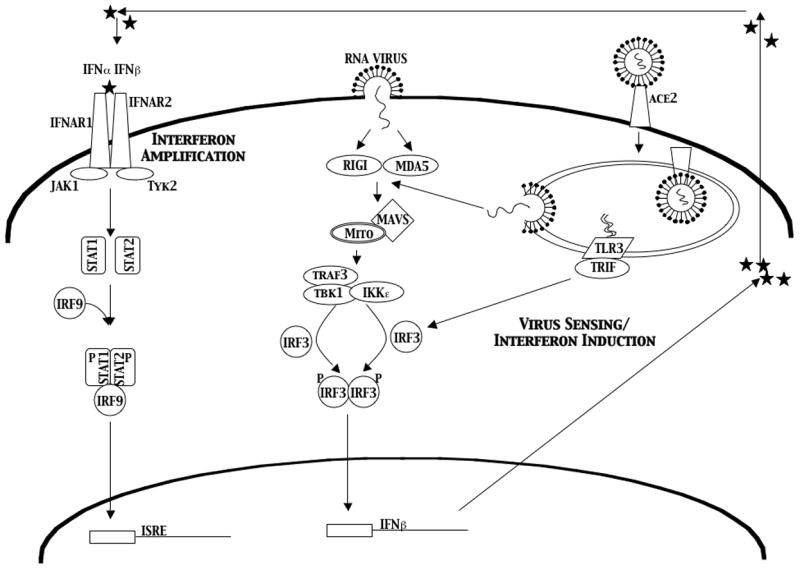
Innate immunity, the first line of defense, becomes activated against the virus before the second line ‘adaptive’ immune system is generated. Both the host and virus can manipulate innate immune mechanisms as a form of defense or evasion strategy. The early innate response also plays an important role in shaping the downstream adaptive immune response. However, an overactive innate immune response can also result in immune pathology and subsequent tissue damage, and this is the path to the cytokine storm effect.2
For the most part, herbs that support the process of overcoming acute viruses don’t over stimulate immune function. In fact, certain plants can help modulate the immune system after the initial beneficial inflammatory immune response.4 Herbs and herbal compounds are more biologically friendly than pharmaceutical drugs, because plants have co-evolved with their target sites and are more adaptive and less toxic to normal cells.5 Experienced herbalists know this, but many people mistakenly believe that the medical profession has the authority to speak as experts on herbal and natural medicine, when in fact most of them have little experience or knowledge in this realm.
For more than four decades I’ve devoted my life to the field of natural health, with a specific interest in botanical medicine. For more than three decades, I’ve been a clinician, and have provided guidance and herbal support to tens of thousands of people. I spend hours every day researching, compiling research, and writing papers. I’ve written detailed monographs on more than 300 herbs, some of which have over 400 citations.
Understanding Herbs from a Traditional and Scientific Perspective
I know herbs intimately, from both the traditional energetic perspective and the modern, research-based scientific approach. I cannot think of one herb that hasn’t been shown to possess anti-inflammatory actions. It’s important to understand that herbs exhibit a broad spectrum of bioactivities and are not single pathway/target mechanisms. Instead, herbs are adaptive, and offer multi-pathway/target actions. This perspective is foreign for people that view herbs through what I think of as the ‘drug lens.’

Herbs are not sledgehammers, and because they work more subtly, are perhaps less ‘glamorous’ than drugs in the ways that they heal. Herbs are humble medicines that work in concert with the innate healing life force. Drugs are analogous to a light switch that can only turn ‘on’ or ‘off.’ But herbs work more like a light switch with a dimmer to regulate, adapt and cross talk with the life force. This, I believe, is the ideal approach.
When conventional drug therapy is called for, a combination of target specific and non-specific global modulating supportive medicine is best. This doesn’t mean that herbs cannot be misused, or that you don’t need professional guidance in choosing and using herbs or herbal formulas. But herbs are much more forgiving and adaptable than many people realize. I often affectionately refer to botanicals as ‘smarty plants’ for this reason.
The catastrophic rise in COVID-19 viral infections and related mortality underscores a growing need to provide safe and effective tools for combatting viral diseases and to boost immune resilience, general robustness and as an aid in auto-regulation. Medicinal herbs are uniquely positioned to support those innate qualities that play an important role in response recovery and restoration. As far as direct anti-virals, this remains a challenge due to the small number of targets in viruses, the rapid evolution of viral genes, the rapid emergence of drug-resistant pathways, and the appearance of new viral strains through mutations.6
Elderberry Is Our Friend, Not Foe

Let’s return to the topic of the rumors circulating about elderberry. The source of this rumor is a 2001 study7 published in the European Cytokine Network Journal. In this double-blind, placebo-controlled, randomized study, elderberry extract reduced the duration of flu symptoms to 3-4 days. Convalescent phase serum showed a higher antibody level to influenza virus in the elderberry extract group compared to the control group. There was no mention of a cytokine storm, but within the study there was reference to the enhancement of pro-inflammatory cytokines after taking elderberry extract leading to the quick, effective recovery and specifically, antibody production.
The study never warned against using elderberry, nor did the researchers express concerns of elderberry causing a cytokine storm. But despite the facts, fake news on the internet has maligned this helpful herb. Drawing upon my years of experience as a clinician and researcher, I can confidently say that herbal medicine is our best defense against acute viruses, particularly when used under the guidance of a well-trained clinical herbalist using high-quality herbs and herbal extracts.
What is a Cytokine Storm?
The ‘cytokine storm’ is a prolonged overactive inflammatory response that occurred in young people in the early stages of some of the past pandemic viruses. In COVID-19, it can happen in older people, when the virus becomes more chronic and the innate constitutional life force is not able to overcome the virus.
During a cytokine storm, a variety of cytokines in bodily fluids are rapidly and massively produced after the body is infected with microorganisms, triggering a ‘suicide attack’ of the human immune system. A cytokine storm also damages lungs and multiple organs such as the heart, kidney and liver, eventually leading to multiple organ exhaustion and shut down.
When the innate immune response doesn’t recognize the SARS-CoV-2 it can panic and begin to storm. The SARS-CoV-2 enters cells through angiotensin-converting enzyme 2 (ACE2). For this reason, lung tissue has become the main invasion target of the SARS-CoV-2 with high expression of ACE2. After the virus enters the lungs, the immune system sends a large number of immune cells to the lung tissue to kill the virus. This causes pneumonia, with fever, cough, and difficulty breathing.
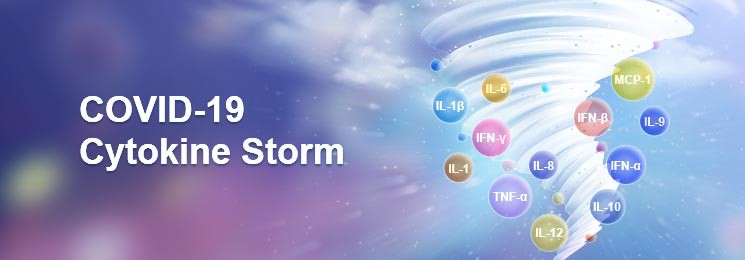
However, these immune cells cannot locate the virus accurately because they are not able to recognize it. When the heighted first phase innate branch of the immune response—which is and should be inflammatory—doesn’t do the job of overcoming the virus, the immune system is not able to produce specific antibodies that recognize and target the virus. They then respond by attacking indiscriminately, recruiting more immune cells to kill the virus. Once a cytokine storm is formed, the immune system may not be able to kill the virus, but instead begins to kill a large number of normal cells in the lung, which will seriously damage the function of the lung. Patients will have respiratory failure until they die of hypoxia.8
In the case of older and weaker people we need to both support the acute response and provide deeper energetic support, providing the body with the energy and heat to aid the overall immune response and recovery. In past pandemic viruses, it was the young that were prone to the effects of the ‘cytokine storm’ because they were too strong constitutionally, and the inflammatory response could not be buffered and controlled. In that case, it was caused by excess heat and inflammation. As in everything, it’s all a question of balance.
Botanical medicines excel in helping to nourish and restore balance. Elderberry is a gentle nutritive tonic, not a strong specialist. It is an excellent aid for strengthening the lungs, heart and liver.
Scientific Support for Elderberry
Elder berries are dark violet-black drupes, which grow in clusters and owe their color to the rich concentration of anthocyanins, a group of phenolic compounds with numerous health benefits. The berries are rich in vitamin C and a wide range of important flavonoids, including quercetin and anthocyanins, which are believed to account for the therapeutic effects. However, elderberries also contain a variety of nutrients ranging from various vitamins (A, B1, B2, B6, B9, C and E), trace elements such as Cu, Zn, Fe; minerals such as K, Ca and Mg; and phytochemicals such as carotenoids, phytosterols and polyphenols.9,10
Elderberries are well known for reducing inflammation and oxidative stress.11 Studies show that elderberry also reduces liver inflammation and improves HDL function and atherosclerotic plaque stability.12
Now, let’s really dig into the topic of elderberry and acute viruses, including corona viruses.
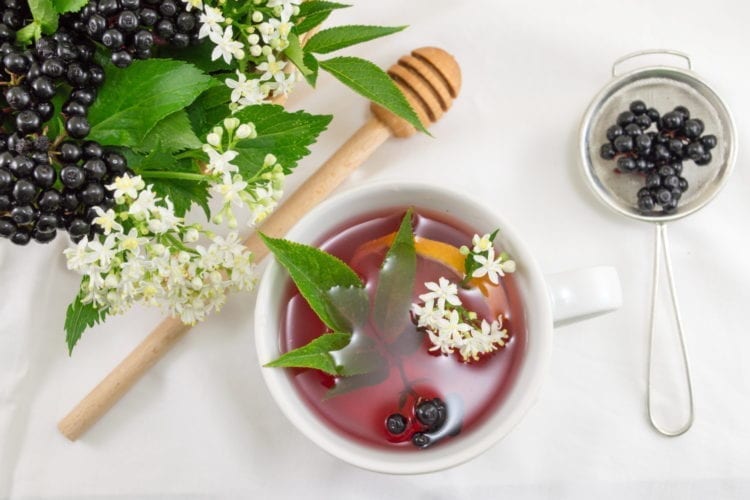
Elderberries are well known as supportive agents against common cold and influenza.13 In studies, elderberry extract has demonstrated an ability to inhibit herpes virus and HIV in cell culture.14 The H1N1 inhibition activities of the elderberry flavonoids compare favorably to the known anti-influenza activities of oseltamivir (Tamiflu®) and amantadine.15
Elderberry contains potent anti-viral compounds. Its anti-influenza ability has been much researched in both Israel and Switzerland.16
Elderberry was demonstrated to combat infectious bronchitis virus (IBV), a pathogenic chicken coronavirus. The study concluded, “These results demonstrate that elderberry extract can inhibit IBV at an early point in infection, probably by rendering the virus non-infectious.”17 The researchers suggested that future studies using elderberry extract to treat or prevent IBV or other coronaviruses are warranted.
Bacterial super-infection during an influenza virus infection can lead to severe pneumonia. A standardized elderberry liquid extract possesses antimicrobial activity against both Gram-positive bacteria of Streptococcus pyogenes and group C and G Streptococci, and the Gram-negative bacterium Branhamella catarrhalis in liquid cultures. The liquid extract also displays an inhibitory effect on the propagation of human pathogenic influenza viruses.18
A meta-analysis of 180 participants quantified the effects of elderberry supplementation and evaluated moderators including vaccination status and the underlying pathology. According to the researchers, “Supplementation with elderberry was found to substantially reduce upper respiratory symptoms. The quantitative synthesis of the effects yielded a large mean effect size. These findings present an alternative to antibiotic misuse for upper respiratory symptoms due to viral infections, and a potentially safer alternative to prescription drugs for routine cases of the common cold and influenza.”19
In a 2016 randomized, double-blind placebo-controlled clinical trial, elderberry extract supplementation reduced cold duration and symptoms in air-travelers.20
As a clinical herbalist, I believe the traditional usage of elderberry is as important as modern scientific findings. In 400 BCE, Hippocrates referred to the elder tree as his ‘medicine chest.’ Theophrastus, Dioscorides and Galen regarded the elder as one of nature’s greatest healing plants. The herbalist Hildegard von Bingen in the 12th century and the physician and author Dr. Martin Blochwich in the 17th century also extolled the virtues of elder.21,22 In the early 20th century, British herbalist Maud Grieves provided a comprehensive review of the historical uses of black elder as a traditional medicine.23
I use elderberry extract extensively in my clinical practice, but I do not use it as a single herb soloist, even when using it for acute illnesses such as the flu. Instead, I combine it with the leaf and flower extract, and several other herbs as indicated. The leaf and flower of elderberry are traditionally known as stimulating diaphoretics, as well as alteratives and diuretics, supporting the removal of waste and toxins through the skin and kidneys.24
Why Elderberry May Be Supportive for People with COVID-19
Finally, I would like to provide you with some theoretical mechanistic reasons why elderberry may actually be supportive for people with COVID-19, and specifically those that be suffering with inflammatory ‘cytokine storm related’ damage.
According to researchers investigating the current epidemic, “when COVID-19 infects the upper and lower respiratory tract it can cause mild or highly acute respiratory syndrome with consequent release of pro-inflammatory cytokines, including interleukin (IL)-1b and IL-6. The binding of COVID-19 to the Toll Like Receptor (TLR) causes the release of pro-IL-1b, which is cleaved by caspase-1, followed by inflammasome activation and production of active mature IL-1b which is a mediator of lung inflammation, fever and fibrosis. Another inhibitory cytokine is IL-38, the newest cytokine of the IL-1 family members, produced by several immune cells including B cells and macrophages. IL-38 is also a suppressor cytokine, which inhibits IL-1b and other pro-inflammatory IL-family members. IL-38 is a potential therapeutic cytokine which inhibits inflammation in viral infections including that caused by COVID-19.”25
Accumulating evidence shows that elderberry, as well as the leaf and flower, contain several functional bioactive compounds, including flavonoids and phenolic acids. The phenolic compounds in elderberry are potent modulators of the immune response, specifically inflammation. They have been shown to decrease the elevated production of inflammatory cytokines, including IL-1b, IL-6, and TNF-a, as well as reactive oxygen species,26,27 both of which contribute to the COVID-19 lung damage.
We’ve known since the 2003 SARS epidemic that the receptor critical for SARS-CoV entry into host cells is the angiotensin-converting enzyme 2 (ACE2). The S1 domain of the spike protein of SARS-CoV attaches the virus to its cellular receptor ACE2 on the host cells.28
The coronavirus is related to Bat-SARS, in that they both use membrane-bound ACE2 as the receptor. The soluble form of ACE2 lacks the membrane anchor and circulates in small amounts in the blood. Researchers have proposed that this soluble form may act as a competitive interceptor of SARS-CoV and other coronaviruses by preventing binding of the viral particle to the surface-bound, full-lengthACE2.29
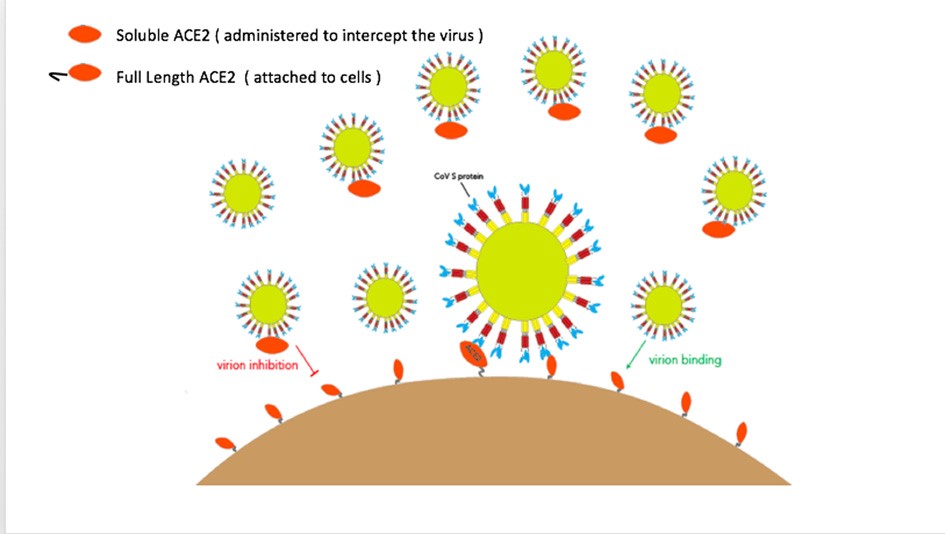
Schematic of coronavirus (CoV) spike protein (S) binding to the surface receptor which is the full-length ACE2 Soluble ACE2 administration may intercept the coronavirus. (Drawn by Nicole Inniss, Ph.D).
Elderberry contains several compounds, again specifically the flavonoids and other phenolics that have been shown to reduce ACE2 binding.30
What Do Malaria and COVID-19 Have in Common?
You may have heard that antimalarial drugs have shown potential in the treatment of COVID-19. Chloroquine, or hydroxychloroquine, has been used to treat malaria since 1944. It can be given before exposure to malaria to prevent infection, and it can also be administered as treatment after exposure. Unlike COVID-19, malaria is a disease that is caused by a parasite. Nevertheless, laboratory studies show chloroquine is effective at preventing as well as treating the virus that causes severe acute respiratory syndrome, or SARS, which is a close cousin of COVID-19. Chloroquine appears to interfere with the attachment to the receptor on the cell membrane surface of the virus.31
Researchers in China found that treating patients with COVID-19-associated pneumonia with chloroquine may shorten their hospital stay and improve the patient’s outcome. Their conclusion: “There is rational, pre-clinical evidence of effectiveness and evidence of safety from long-time clinical use for other indications to justify clinical research on chloroquine in patients with COVID-19.”32
Other research indicates that hydroxychloroquine, a less toxic derivative of chloroquine, is effective in inhibiting SARS-CoV-2 infection and specifically inhibits IL-1β production from amyloid-stimulated human neutrophils.33
In the Chinese medical tradition, a multiherb remedy used for the treatment and prevention of SARS has been shown to have a robust inhibitory effect through the classical pathway and the alternative pathway, and its activity could be attributed to the flavonoids (many of which are in elderberry, leaf and flower) present in herbs.34
The FDA is taking urgent measures to protect consumers from products that, without approval or authorization by the FDA, claim to mitigate, prevent, treat, diagnose, or cure COVID-19. But I believe it is essential to spread the knowledge that herbal and nutritional medicine can help to promote health and immune resiliency, even though these supportive therapies are not currently approved as a treatment for COVID-19. My hope is that you find this information informative and useful as related to the safety and usefulness of elderberry extract.
Be well, care for yourself and one another, and know that we will get through this difficult time with the help of our herbal allies and each other.
References:
- Alcami A, Koszinowski UH., Viral mechanisms of immune evasion, Immunol Today. 2000 Sep; 21(9):447-55.
- Matthew Frieman,1,* Mark Heise,2,3,4 and Ralph Baric. SARS CORONAVIRUS AND INNATE IMMUNITY, Virus Res. 2008 Apr; 133(1): 101–112. Published online 2007 Apr 23. doi: 10.1016/j.virusres.2007.03.015
- Laiosa CV, Stadtfeld M, Graf T., Determinants of lymphoid-myeloid lineage diversification. Annu Rev Immunol. 2006; 24():705-38.
- Murphy K, Travers P, Walport M (2007). “Signaling Through Immune System Receptors”. Janeway’s Immunobiology (7th ed.). London: Garland. ISBN 978-0-8153-4123-9.
- Mishra, B.B.; Tiwari, V.K. Natural products: An evolving role in future drug discovery. Eur. J. Med. Chem. 2011, 46, 4769–4807.
- Martins N, Imler JL, Meignin C., Discovery of novel targets for antivirals: learning from flies. Curr Opin Virol. 2016 Oct; 20():64-70.
- V Barak, T Halperin, I Kalickman, The Effect of Sambucol, a Black Elderberry-Based, Natural Product, on the Production of Human Cytokines: I. Inflammatory Cytokines, Eur Cytokine Netw, 12 (2), 290-6 Apr-Jun 2001.
- https://www.cusabio.com/COVID-19-Cytokine-Storm, retrieved March 21, 2019.
- V. Schmitzer, R. Veberic, A. Slatnar, and F. Stampar, “Elderberry (Sambucus nigra L.) wine: A product rich in health-promoting compounds,” Journal of Agricultural and Food Chemistry 58(18) (2010): 10143–46.
- Viapiana A, Wesolowski M. The phenolic contents and antioxidant activities of infusions of Sambucus nigra L. Plant Foods Hum Nutr. 2017;72(1):82-87.
- Viapiana A, Wesolowski M. The phenolic contents and antioxidant activities of infusions of Sambucus nigra L. Plant Foods Hum Nutr. 2017;72(1):82-87.
- Millar CL, Norris GH, Jiang C, Kry J, Vitols A, Garcia C, Park YK, Lee JY, Blesso CN. Long-Term Supplementation of Black Elderberries Promotes Hyperlipidemia, but Reduces Liver Inflammation and Improves HDL Function and Atherosclerotic Plaque Stability in Apolipoprotein E-Knockout Mice. Mol Nutr Food Res. 2018 Dec;62(23):e1800404. doi: 10.1002/mnfr.201800404.
- Porter RS, Bode RF. A Review of the Antiviral Properties of Black Elder (Sambucus nigra L.) Products. Phytother Res. 2017 Apr;31(4):533-554. doi: 10.1002/ptr.5782. Epub 2017 Feb 15.
- Z. Zakay-Rones, N. Varsarno, M. Zlotnik, et al., “Inhibition of several strains of influenza virus in vitro and reduction of symptoms by an elderberry extract (Sambucus nigra L.) during an outbreak of influenza B Panama,” Journal of Alternative and Complementary Medicine 1 (1995): 361–69.
- R. C. Fink, B. Roschek Jr., and R. S. Alberte, “HIV type-1 entry inhibitors with a new mode of action,” Antiviral Chemistry and Chemotherapy 19(6) (2009): 243–55.
- B. Roschek Jr., R. C. Fink, M. D. McMichael, D. Li, and R. S. Alberte, “Elderberry flavonoids bind to and prevent H1N1 infection in vitro,” Phytochemistry 70(10) (2009): 1255–61.
- Christie Chen, David M Zuckerman, Susanna Brantley, Michka Sharpe, Kevin Childress, Egbert Hoiczyk, Amanda R Pendleton , Sambucus Nigra Extracts Inhibit Infectious Bronchitis Virus at an Early Point During Replication, BMC Vet Res, 10, 24, 2014 Jan 16, DOI: 10.1186/1746-6148-10-24.
- Krawitz C, Mraheil MA, Stein M, Imirzalioglu C, Domann E, Pleschka S, Hain T. Inhibitory activity of a standardized elderberry liquid extract against clinically-relevant human respiratory bacterial pathogens and influenza A and B viruses. BMC Complement Altern Med. 2011 Feb 25;11:16. doi: 10.1186/1472-6882-11-16.
- Hawkins J1, Baker C2, Cherry L2, Dunne E., Black elderberry (Sambucus nigra) supplementation effectively treats upper respiratory symptoms: A meta-analysis of randomized, controlled clinical trials. Complement Ther Med. 2019 Feb;42:361-365. doi: 10.1016/j.ctim.2018.12.004.
- Evelin Tiralongo,1,2,* Shirley S. Wee,2,3 and Rodney A. Lea, Elderberry Supplementation Reduces Cold Duration and Symptoms in Air-Travellers: A Randomized, Double-Blind Placebo-Controlled Clinical Trial, Nutrients. 2016 Apr; 8(4): 182. Published online 2016 Mar 24. doi: 10.3390/nu8040182.
- Krawitz C, Mraheil MA, Stein M, Imirzalioglu C, Domann E, Pleschka S, Hain T. Inhibitory activity of a standardized elderberry liquid extract against clinically-relevant human respiratory bacterial pathogens and influenza A and B viruses. BMC Complement Altern Med. 2011 Feb 25;11:16. doi: 10.1186/1472-6882-11-16.
- Blochwitch M. Anatomia sambuci, or, The Anatomy of the Elder cutting out of it plain, approved, and specific remedies for most and chiefest maladies: confirmed and cleared by reason, experience, and history. London: H Brome and T Sawbridge; 1677.
- Grieve M. In: A Modern Herbal. Leyel, C.F, editor. 2010.
- Ellingwood, F., MD. American Materia Medica, Therapeutics and Pharmacognosy, 1918, Eclectic medical Publications, pg. 451.
- P Conti1, G Ronconi2, A Caraffa3, C Gallenga4, R Ross5, I Frydas6, S Kritas#7Induction of Pro-Inflammatory Cytokines (IL-1 and IL-6) and Lung Inflammation by COVID-19: Anti-Inflammatory Strategies, J Biol Regul Homeost Agents, 34 (2) 2020 Mar 14[Online ahead of print]
- Joanna Zielińska-Wasielica, Anna Olejnik, Katarzyna Kowalska, Mariola Olkowicz, Radosław Dembczyński, Elderberry (Sambucus nigra L.) Fruit Extract Alleviates Oxidative Stress, Insulin Resistance, and Inflammation in Hypertrophied 3T3-L1 Adipocytes and Activated RAW 264.7 Macrophages, Foods. 2019 Aug; 8(8): 326. Published online 2019 Aug 8. doi: 10.3390/foods8080326.
- Wira Eka Putra, Muhaimin Rifa’I, Immunomodulatory Activities of Sambucus javanica Extracts in DMBA-Exposed BALB/c Mouse, Adv Pharm Bull. 2019 Oct; 9(4): 619–623. Published online 2019 Oct 24. doi: 10.15171/apb.2019.071.
- Daniel Batlle1 , Jan Wysocki1 and Karla Satchell, Soluble angiotensin-converting enzyme 2: a potential approach for coronavirus infection therapy?, Clinical Science (2020) 134 543–545, https://doi.org/10.1042/CS20200163
- Menachery, V.D., Yount, Jr., B.L., Debbink, K., Agnihothram, S., Gralinski, L.E., Plante, J.A. et al. (2015) A sars-like cluster of circulating batcoronaviruses shows potential for human emergence. Nat. Med. 21, 1508–1513, https://doi.org/10.1038/nm.3985.
- B.W. Nileeka Balasuriya and H.P. Vasantha Rupasinghe , Plant flavonoids as angiotensin converting enzyme inhibitors in regulation of hypertension, Functional Foods in Health and Disease 2011; 5:172-188.
- Devaux CA, Rolain JM, Colson P, Raoult D. New insights on the antiviral effects of chloroquine against coronavirus: what to expect for COVID-19? Int J Antimicrob Agents. 2020 Mar 11:105938. doi: 10.1016/j.ijantimicag.2020.105938.
- Andrea Cortegiani1, Giulia Ingoglia2, Mariachiara Ippolito2, Antonino Giarratano2, Sharon Einav3A Systematic Review on the Efficacy and Safety of Chloroquine for the Treatment of COVID-19, J Crit Care, 2020 Mar 10[Online ahead of print, DOI: 10.1016/j.jcrc.2020.03.005.
- Fujita Y, Matsuoka N, Temmoku J, Furuya MY, Asano T, Sato S, Kobayashi H, Watanabe H, Suzuki E, Urano T, Kozuru H, Yatsuhashi H, Koga T, Kawakami A, Migita K. Hydroxychloroquine inhibits IL-1β production from amyloid-stimulated human neutrophils. Arthritis Res Ther. 2019 Nov 27;21(1):250. doi: 10.1186/s13075-019-2040-6.
- Zhang T, Chen D. Anticomplementary principles of a Chinese multiherb remedy for the treatment and prevention of SARS. J Ethnopharmacol. 2008 May 8;117(2):351-61. doi: 10.1016/j.jep.2008.02.012. Epub 2008 Feb 17.


